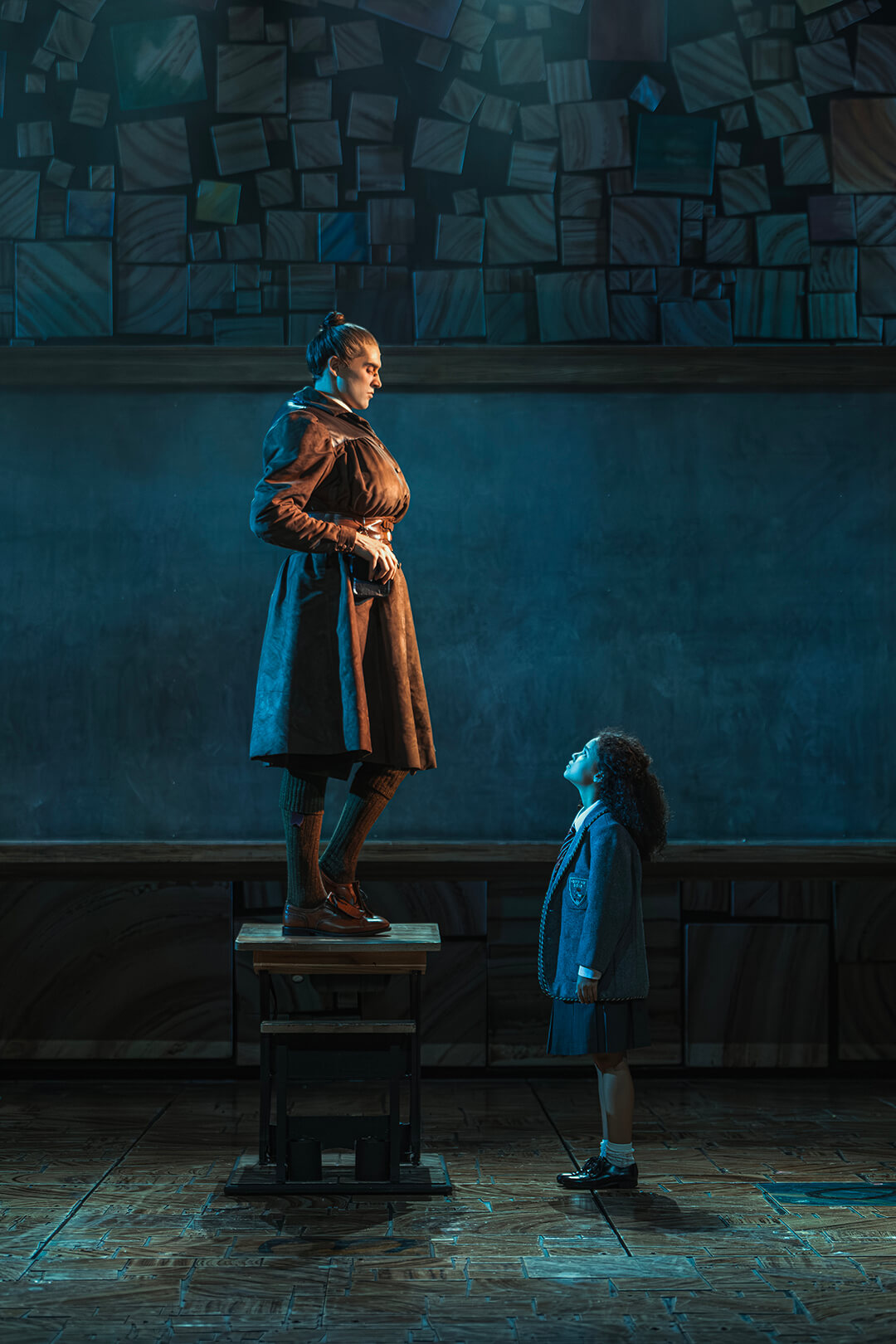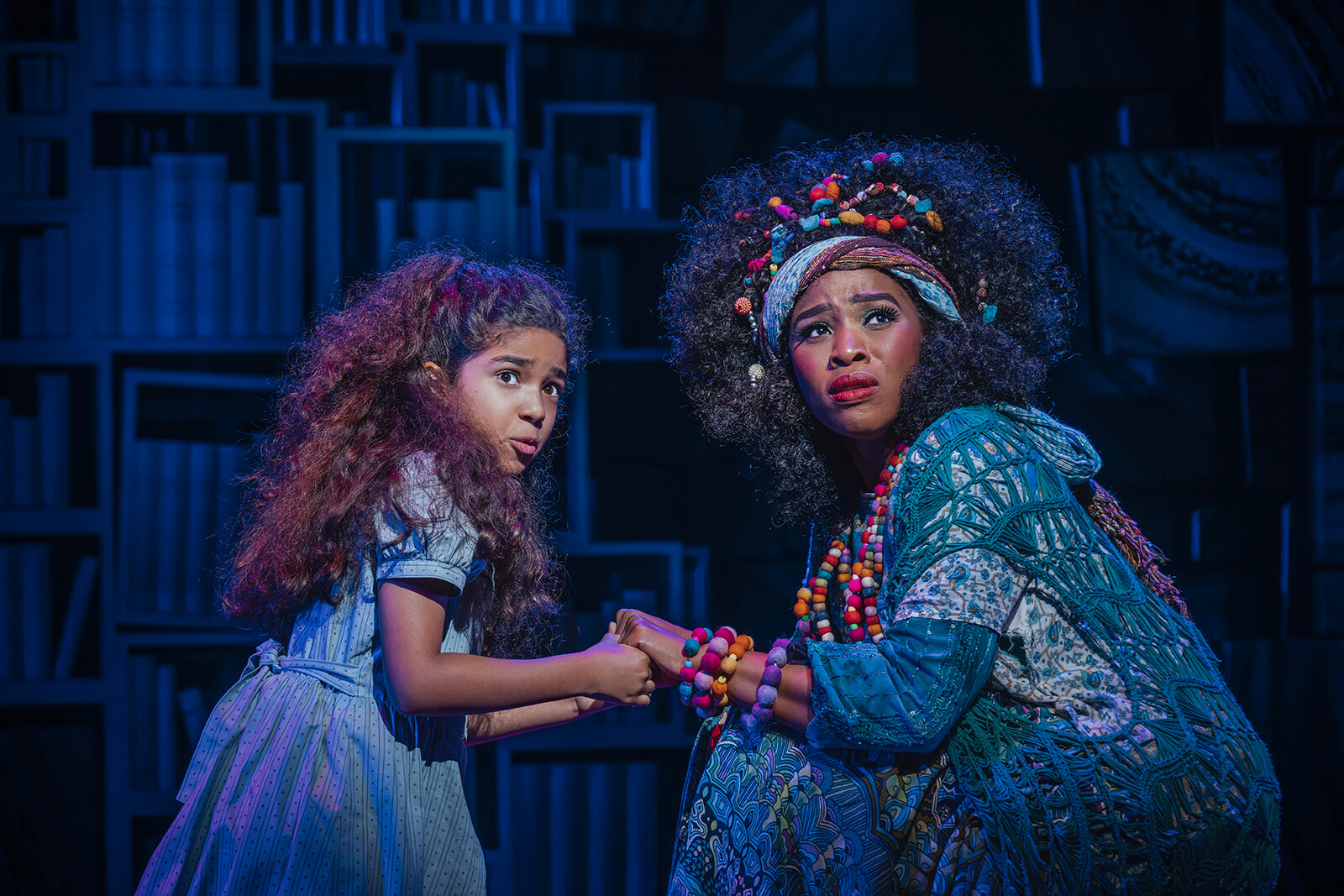A London exhibition reflects on shared South Asian histories and splintered maps
by Samta NadeemJun 19, 2025
•make your fridays matter with a well-read weekend
by Ranjana DavePublished on : Jun 15, 2024
The Nita Mukesh Ambani Cultural Centre (NMACC) in Mumbai is a tourist attraction of sorts. When I visited to watch Matilda the Musical (May 16 - June 2, 2024) at its Grand Theatre on a muggy May evening, its corridors thronged with flaneurs, selfie-takers and an audience of excited children (accompanied by obliging adults). A production by the Royal Shakespeare Company, the musical is based on Roald Dahl’s eponymous 1988 children’s novel. As we waited to be allowed into the theatre, a young girl seated next to me in NMACC’s sparkling lobby determinedly poked her guardian’s ribs, asking, “Is Matilda already inside the theatre?” The actor playing Matilda that evening may well have been in her dressing room, but at the cafe, theatregoers were already inserting themselves into Dahl’s timeless narrative by buying Matilda cake – layers of gooey chocolate sponge enveloped in chocolate fudge frosting.

Born to uncaring parents, Matilda is a wunderkind with great intelligence and special powers. She uses both to humble her nemesis, the cruel headmistress Miss Trunchbull. Matilda is empowered by the support of her equally oppressed classmates and her kind teacher Miss Honey, who has always lived in fear of Trunchbull, who is both her aunt and boss. Matilda the Musical follows popular Broadway musicals The Sound of Music and West Side Story in its journey to the NMACC. "Matilda is a tale of courage, kinship, and adventure — qualities that resonate deeply with me as a teacher, mother, and now grandmother. It’s a joy to bring this celebrated production by the Royal Shakespeare Company to India for the very first time, aligning with our vision of presenting the best of India and the world at NMACC,” Nita Ambani, Founder and Chairperson, NMACC, noted.
Matilda is a tale of courage, kinship, and adventure — qualities that resonate deeply with me as a teacher, mother, and now grandmother. It’s a joy to bring this celebrated production by the Royal Shakespeare Company to India for the very first time, aligning with our vision of presenting the best of India and the world at NMACC. – Nita Ambani, Founder and Chairperson, NMACC
The musical is a three-hour song-and-dance extravaganza with an international cast, the lead role staffed by a rotating cast of three child actors who double up in chorus roles when they are not headlining the show. The casting is diverse, with actors of colour cast in lead roles. The production is high-octane and makes heavy demands of performers—the cast I watched sang in perfect tune, performed complex synchronised dance numbers, and they were also extremely agile, leaping on and off furniture and sets with zero hesitation. The ease in their performances is supported by fastidious training and rehearsal. Natalie Gilhome, Resident Director for the tour, shared details of the training regimen, which focuses on the actors’ physical and technical ability. “We do a lot of daily maintenance after warm-ups each day before a show to make sure each moment in the show is exactly right. There are also weekly understudy rehearsals to ensure that all the understudies are ready at any second to perform. The actors maintain their fitness at the gym…if [they are] in a country where dance classes are accessible, they will attend some outside classes to challenge themselves. Part of my job is watching the shows and taking notes, so we often have note sessions with the actors to discuss moments in the show,” she said, explaining the work that goes into refining every second of the show. Sitting in the Dress Circle, the actors’ faces were blimps in the distance, but their energy and training came through (aided by the powerful scenography).

Scenes with special effects were greeted with torrents of applause – when Matilda’s friend Amanda Thripp is swung by her pigtails and thrown over a fence, the theatre is flooded with screams of horrified delight. Actor James Wolstenholme, playing Miss Trunchbull, said, “The story of Matilda transcends cultural differences and speaks to audiences young and old in any country. It feels as though every audience member, regardless of the country we are in, can relate to the themes of the show. Childhood, bravery, standing up for what you believe is right.”
The audience in Mumbai mainly seemed to be made up of private school students; many of them are used to encountering a wide range of English accents in school, on social media and across popular culture. Many had watched film adaptations of Matilda, coming in with a sense of the story. There are multiple Matilda films; the 2022 version on Netflix uses the same screenplay as the stage musical, penned by British writer and producer Dennis Kelly. “Matilda was one of the first movies we watched together,” said journalist Phorum Pandya, who watched the show with her nine-year-old niece. For viewers familiar with the story, the charm lies in the musical’s elaborate staging of it. Pandya’s niece relates best to a minor character, Lavender, who is Matilda’s friend in the story. “She's at that age where she's meeting friends, so I think she relates to that, that [Lavender] is Matilda's friend.”

For others, the school environment in Matilda, grim and rule-abiding, came as a surprise. “The kids that saw this show were all kids that go to either private schools or fancy IB (International Baccalaureate) schools. Many of these schools don’t have a very rigid or strict culture,” said director and writer Rachel D’Souza, whose young daughter was full of questions about schools that had strict rules for their students after the show. The performance sparked an interesting conversation about shifts in student-teacher dynamics between mother and daughter. D’Souza found herself recalling her own memories of school, “You have to sit in class, you can’t stand up, you can’t walk around. I went through some of the rules, which we still have in public schools, BMC schools and even convent schools…it’s not so much a cultural reference, it is class-related. And that was something she could not relate to. She calls it ‘rule school’ and she asks – why can’t we just complain if the principal is like this? Why can’t we just have the principal changed?”
For the actors, each performance is an opportunity to discover something new in the role and learn more about themselves. Gina Beck, who plays Miss Honey, said, “I never tire of trying to make my character as believable as possible. I'm constantly discovering things that I hadn't ever considered before, and that's nearly 1000 performances in the role!” For me, the stage musical summoned up memories of the 1996 film, which I watched on cable television as a young child. In my glitchy two-dimensional memories, Matilda’s naughty gap-toothed smile as she orchestrated small mutinies against her evil headmistress came rushing up; I experienced the story as a string of deja vu moments – the student hurled over a fence, the sharp nails and glass on the walls of Miss Trunchbull’s private prison for students and the lizard Matilda’s friend Lavender pops into the headmistress’ jug of water. The story is its own universe; it invites audiences to situate themselves within the narrative. The ambience of NMACC’s Grand Theatre aids their journey from reality to fantasy, both technically and emotionally, with its full-sized stage and tech capacity and its visual affinity to the opera houses of yore.
by Maanav Jalan Oct 14, 2025
Nigerian modernism, a ‘suitcase project’ of Asian diasporic art and a Colomboscope exhibition give international context to the city’s biggest art week.
by Shaunak Mahbubani Oct 13, 2025
Collective practices and live acts shine in across, with, nearby convened by Ravi Agarwal, Adania Shibli and Bergen School of Architecture.
by Srishti Ojha Oct 10, 2025
Directed by Shashanka ‘Bob’ Chaturvedi with creative direction by Swati Bhattacharya, the short film models intergenerational conversations on sexuality, contraception and consent.
by Asian Paints Oct 08, 2025
Forty Kolkata taxis became travelling archives as Asian Paints celebrates four decades of Sharad Shamman through colour, craft and cultural memory.
 surprise me!
surprise me!
make your fridays matter
SUBSCRIBEEnter your details to sign in
Don’t have an account?
Sign upOr you can sign in with
a single account for all
STIR platforms
All your bookmarks will be available across all your devices.
Stay STIRred
Already have an account?
Sign inOr you can sign up with
Tap on things that interests you.
Select the Conversation Category you would like to watch
Please enter your details and click submit.
Enter the 6-digit code sent at
Verification link sent to check your inbox or spam folder to complete sign up process



by Ranjana Dave | Published on : Jun 15, 2024
What do you think?